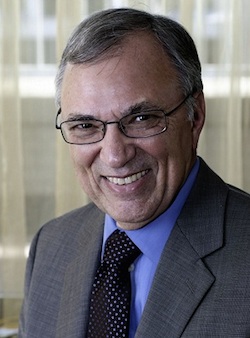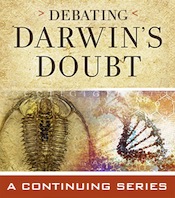 Evolution
Evolution
 Faith & Science
Faith & Science
 Intelligent Design
Intelligent Design
Leading Theistic Evolutionist Darrel Falk, Past BioLogos President, Praises Darwin’s Doubt
 As readers of Evolution News & Views will likely already know, BioLogos is a Christian organization founded by geneticist Francis Collins, current director of the NIH. In years past the group has emphasized what it regards as the necessity of embracing Darwinian evolution over the competing theory of intelligent design. It has broadcast this message to the Christian community, and with some success.
As readers of Evolution News & Views will likely already know, BioLogos is a Christian organization founded by geneticist Francis Collins, current director of the NIH. In years past the group has emphasized what it regards as the necessity of embracing Darwinian evolution over the competing theory of intelligent design. It has broadcast this message to the Christian community, and with some success.
Meanwhile, though, much to the credit of our friends at BioLogos, leading spokesmen for the theistic evolutionary view have sought to engage in constructive dialogue with advocates of ID.
It’s gratifying to report that our conversations have borne fruit. At the BioLogos website, developmental geneticist and past BioLogos president Darrel Falk (pictured at left) has now contributed a two-part review of Stephen Meyer’s book Darwin’s Doubt that is, candidly, remarkable. (See Part I and Part II.)
 For Dr. Falk, now Senior Advisor for Dialog at BioLogos, Darwin’s Doubt is "amazingly effective" and "Meyer has successfully put his finger on one of the great mysteries in evolutionary biology today."
For Dr. Falk, now Senior Advisor for Dialog at BioLogos, Darwin’s Doubt is "amazingly effective" and "Meyer has successfully put his finger on one of the great mysteries in evolutionary biology today."
Regarding the scientific evidence of design in nature, it would certainly be too much to read the review as an indication that theistic evolutionists are close to changing their fundamental view. Indeed Dr. Falk’s articles come in the context of a series of critical articles on the BioLogos site responding to Meyer. Those include philosopher and historian Robert Bishop’s posts denying Dr. Meyer’s observation that mainstream scientific literature increasingly reflects misgivings about Darwinian theory and a search for new, post-Darwinian paradigms. (See Paul Nelson and Casey Luskin’s comments.)
Falk affirms the enigma of the Cambrian explosion with its "rapid" production of new body plans from no identifiable predecessors, just as Meyer explains it in Darwin’s Doubt. Likewise echoing Meyer, he confirms that current evolutionary thinking is frustrated in seeking to explain how complex animal life arose. Writes Falk:
The big mystery associated with the Cambrian explosion is the rapid generation of body plans de novo. There was never a time like it before, nor has there ever been a time like it again since. Stephen is right about that. Also, as he points out, the big question in exploring the generation of new body plans in that era is how this squares with the resistance of today’s gene regulatory networks to mutational perturbation (i.e. they seem to be almost impossible to change through genetic mutation because virtually all such alterations are lethal). We really have little idea at this point how things would have worked to generate body plans de novo back then given the sensitivity of the networks to perturbation today.
More:
The depth of knowledge [Meyer] displays in molecular genetics, developmental biology, and population genetics in addition to paleontology, animal diversity, biochemistry, and even some cell biology is very impressive.
In inferring design, however, Falk writes, "I think [Meyer is] wrong, of course."
And:
So have I softened on Intelligent Design as a scientific endeavor? I don’t think so, but I have grown to appreciate the skill and the sincerity of various individuals I have met in the ID movement over the last five years.
Nevertheless, for Dr. Falk at least, Darwin’s Doubt is a breakthrough. While still rejecting the evidence for design presented in previous books about ID by Meyer, Behe, and others, he warmly praises the scientific argument in the book, identifies no fault in its presentation of the relevant science, and, significantly, takes issue with his colleague Robert Bishop’s denial that biologists are having second thoughts about Darwinian theory.
In response to Bishop, Falk asks, "Does Stephen Meyer exaggerate the nature of the rethinking going on in mainstream evolutionary developmental biology?" He answers:
I don’t think so. Many evolutionary developmental biologists think that we are on the verge of a significant re-organization in our thinking about the mechanics of macro-evolution. The much respected developmental biologist Scott Gilbert states: "If the population genetics model of evolutionary biology isn’t revised by developmental genetics, it will be as relevant to biology as Newtonian physics is to current physics."
That and many other similar statements that I’ve seen in the literature[1] really do suggest that we are on the cusp of some major rethinking about the forces at work in macro-evolution. Those studies will focus more on how biological information is generated, changed, and used, and less on the natural selection filter.
In short, he confirms the negative side of Meyer’s argument. Given that Dr. Falk is the only biologist among the lineup of reviewers offered by BioLogos, that is important.
What about the positive argument, for ID itself? Falk’s review is helpful in clarifying where the conversation about intelligent design and theistic evolution can go from here. His real objection to design theory isn’t scientific but rather a matter of philosophical sensibility or predisposition:
[ID proponents] think the philosophical naturalism of many leading scientists has significantly influenced their conclusions, and I certainly agree that there have been times when that is the case. However, where we don’t agree is that the whole applecart of evolutionary biology needs to be turned upside down and replaced with a new science — one grounded in the scientific demonstration of Intelligence. I see no scientific, biblical, or theological reason to expect that. Natural processes are a manifestation of God’s ongoing presence in the universe.
It seems to be precisely his a priori commitment to methodological naturalism that holds him back from joining us in recognizing design in biology:
Stephen is right, that none of the other [evolutionary] models fit the bill in a fully satisfactory manner yet, but it’s pretty early to declare one to be the winner on the basis of an analogy to human-designed information systems.
He regards that recognition as premature, but for the methodological naturalist it must, by definition, always be premature to affirm intelligent design:
I agree with Robert [Bishop] that it is quite a stretch to jump from the "failure" of materialistic explanations of the Cambrian explosion (so far) to a scientifically based conclusion that life is intelligently designed.
Between theistic evolutionists and proponents of intelligent design there remains a sharp divide, specifically, in our views of what constitutes a potentially legitimate scientific inference and what does not. So we have a lot to talk about with our colleagues at BioLogos. Falk’s review does a service by making clear what needs to be on the agenda of future discussions.
Dr. Falk has good questions, too, about the future of ID as a research program. He would like to know, beyond the critique of Darwinism, how we envision intelligent design as a positive paradigm for the scientific investigation of nature. He can’t picture what that would look like. He also asks what predictions ID might make. How can the theory be tested?
How will they move forward by building a positive research program rather than a negative one based upon the critique of mainstream ideas? What are the biological predictions that will emerge from within their paradigm and how will they test them?
These are wonderful challenges, and of course we have given them much consideration ourselves. As food for thought, I commend to Falk our reporting here at ENV on how mainstream scientists, without explicitly recognizing it, are already employing assumptions about design to advance biology. See, for example, Casey Luskin’s recent coverage on the field of systems biology:
Other relevant articles include:
And see the Appendix in Signature in the Cell in which Stephen Meyer lists a slew of predictions of the theory of ID.
I don’t want to overstate how close Darrel Falk has drawn to us. Does he, for example, fall into old habits in discussing top ID theorists? Yes, he does. He commends Dr. Meyer, for instance, for his "sincerity" while also calling the book "somewhat of a masterpiece for accomplishing their agenda."
That seems out of place in weighing a serious and popular work like Darwin’s Doubt — by a Cambridge University-trained philosopher of science and leading advocate of a scientific theory that is a force to be reckoned with in scholarly thinking, a book that is still No. 1 on Amazon’s Paleontology bestseller list ahead of books by Nicholas Wade, Stephen Jay Gould, and Douglas Erwin and James Valentine.
But so what? The good news in Darrel’s review is very good indeed. For every Darrel Falk in the theistic evolution community, whose name we know, there are undoubtedly many others whose names we don’t know who are similarly ready to break with old attitudes.
Dr. Falk deserves praise for his fresh approach to the issues at hand, and, not least, for his willingness to publicly correct a colleague, Dr. Bishop, who he knows to be mistaken on an important matter. That takes courage. We look forward to further discussions not only with Darrel Falk but with other open-minded theistic evolutionists.
